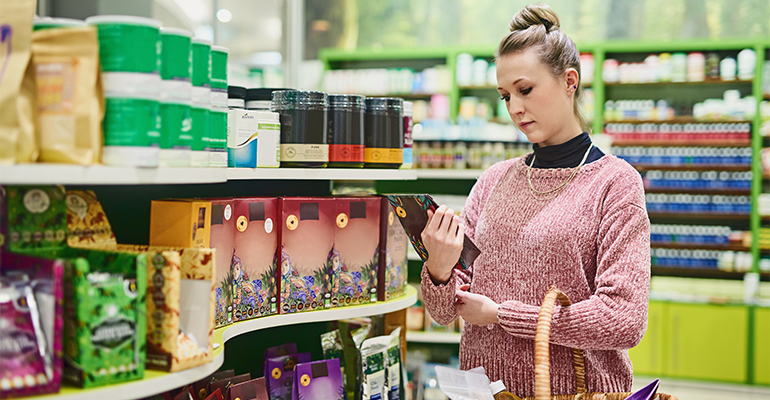News
SPINS forecasts 2025 US nutraceutical growth driven by younger consumers
22 Jan 2025The latest SPINS 2025 CPG Outlook: Industry Update & Trends Predictions report highlights younger consumers’ increasing influence on the nutraceutical and functional food markets in the US.

SPINS, a wellness-focused data analytics provider, specialises in tracking natural product sales and market behaviour in the US. According to its latest predictions, anti-ageing supplements, high-protein snacks, and functional beverages are expected to lead growth, driven by a rising focus on proactive health management and personalised nutrition strategies.
SPINS’ findings suggest that brands that can balance innovation, scientific substantiation, and values-driven storytelling will be best positioned for sustained growth in the nutraceutical market.
Natural products outpacing conventional sales
According to SPINS data, natural and organic product sales are projected to reach nearly $320 billion in 2024, with an annual growth rate of 5% expected to push this figure to $384 billion by 2028. This sustained growth reflects a continued preference for wellness-driven products across food, beverage, and dietary supplements.
The natural channel, which includes specialty health stores and independent retailers, has consistently outpaced conventional grocery channels in both revenue and unit growth. Notably, natural products reported a 6.6% increase, compared to a 1.1% decline in conventional products.
A key driver of this expansion is a younger, health-conscious consumer base. The report highlights Gen Z and younger millennials as central to the shift, as these groups increasingly prioritise wellness, sustainability, and ingredient transparency when making purchasing decisions.
Anti-ageing supplements and cellular health ingredients surge
The SPINS report identifies anti-ageing and cellular health as among the fastest-growing trends in the supplement sector. Magnesium, creatine, and collagen are leading this growth, with magnesium sales rising by 31.6% and creatine by 32.8%.
Collagen, a staple in beauty supplements, continues to maintain popularity, while NMN (nicotinamide mononucleotide) is emerging as a significant player in the longevity space. NMN has gained attention for its potential to reduce inflammation and support cellular health, particularly in age-related wellness products.
Another bioactive ingredient showing growth in this category is vitamin K, which saw a 47% increase in sales. The report attributes this rise to consumer interest in proactive health strategies targeting cellular ageing, muscle maintenance, and cognitive support.
Functional beverages and high-protein snacks gain ground
Functional beverages and protein-dense snacks remain central to the wellness product market, driven by demand for nutrient-packed, convenient formats.
Wellness shots and kombucha continue to perform well, with kombucha sales rising by 2.6% and wellness shots growing by 13.6%. This reflects broader consumer interest in gut health and holistic wellness, with ingredients like probiotics and ashwagandha leading the charge. Ashwagandha, recognised for its stress-reducing properties, reported a 100.3% increase in sales, while magnesium-enriched beverages grew by 106.8%.
Protein remains a key category for innovation, particularly in snack and RTD (ready-to-drink) beverages. Whey and casein protein products recorded a 120.4% increase, while pea protein products saw a 24% rise. Products combining animal and plant protein sources saw a significant decline of 8.2%.
Personalised nutrition and biohacking technologies
The report underscores the rising influence of personalised health technologies, particularly among younger consumers. Wearable health tech, such as continuous glucose monitors and fitness trackers, is reshaping consumer expectations around personalised nutrition.
These tools allow individuals to monitor real-time health metrics, such as blood glucose levels and sleep quality, driving demand for products that can be tailored to individual health goals. As a result, personalised supplement packs and functional foods targeting specific health outcomes – like metabolic health, stress management, and muscle recovery – are gaining traction.
Biohacking, or the practice of self-optimisation through data-driven health interventions, is also influencing supplement trends. SPINS notes increased interest in nootropic supplements, stress-relief formulas, and metabolic health products aimed at proactive wellness strategies.
Digital platforms are also playing a more significant role in shaping purchasing behaviours. The report notes a surge in consumers turning to video platforms and AI-powered tools for supplement recommendations, product reviews, and health guidance.
Short-form videos, product review content, and influencer-led health discussions are increasingly influencing purchasing decisions. Peer-to-peer recommendations, particularly within wellness communities, have gained credibility as consumers seek authentic voices over traditional advertising.
Direct-to-consumer brands and online health platforms offering personalised recommendations have gained market share, reflecting a broader shift towards digital-first health purchasing habits.
Proactive health and wellness priorities redefine product innovation
SPINS identifies a shift in consumer priorities from lifespan extension towards optimising healthspan – the years of functional, healthy living. This trend is evident in the rising demand for products supporting preventative health, such as functional foods targeting muscle health, metabolic balance, and immune resilience.
The focus on healthspan has led brands to innovate with multi-benefit formulations that combine protein, fibre, and gut-health ingredients in single products. High-fibre functional snacks, low-sugar protein bars, and beverages enriched with adaptogens reflect this evolving demand for comprehensive wellness solutions.
This shift also extends to cognitive health and stress management. The report highlights increased sales of mood-support ingredients, including kratom, functional beverages, and CBD, as consumers prioritise mental well-being alongside physical health.
Related news

Bone broth: From old-fashioned to en vogue
24 Nov 2025
OXO’s entry into bone broth has turned the spotlight on this small but high-performance category – and there is still scope for growth, especially in the area of GLP-1 support.
Read more
UK Government overhauls childhood obesity strategy
21 Nov 2025
The UK Government has announced a new package of measures designed to reverse the nation’s childhood obesity epidemic following the release of statistics revealing the scale of the crisis.
Read more
Nitrites: Pressure grows on UK to follow EU’s lead
20 Nov 2025
Pressure is growing on the UK to follow the EU’s lead after the bloc revised its regulations on the permitted levels of nitrites and nitrates in cured meats.
Read more
Matcha madness: Why green is this year’s hottest colour
19 Nov 2025
Five years ago, it was a struggle to find matcha outside of Japan. Now it seems to be popping up everywhere, from coffee shops to supermarket shelves.
Read more
How younger consumers are redefining ingredient choices and rejecting brand loyalty
18 Nov 2025
Gen Z and millennial consumers’ preferences for transparency, functionality, and purpose are “redefining the very nature of consumption itself”, says SPINS.
Read more
Hybrid formats and flexible positioning to disrupt category norms in 2026
17 Nov 2025
Trend forecasters expect food and drink to move more fluidly across occasions, functions, and formats as consumers seek versatility, novelty, and convenience.
Read more
Danone highlights digestive health as potential ‘tipping point’ for food industry
13 Nov 2025
Danone is betting on a food industry “tipping point” that will bloat the market for healthy products, particularly those related to gut health.
Read more
Soy story: WWF scores UK supermarkets on sustainability efforts
12 Nov 2025
WWF has published its latest “Soy Scorecard”, ranking UK supermarkets’ efforts to combat deforestation and land conversion in their soy supply chains.
Read more
New UPF standard hoped to offer consumers ‘coherence and clarity’
10 Nov 2025
Ingredients companies are being urged to enter “a new era of partnership and innovation” following the launch of the industry’s first non-UPF verification scheme.
Read more
Cottage cheese makes a comeback as consumers call for cleaner labels
6 Nov 2025
From ice cream to dips and ready meals, cottage cheese is experiencing a renaissance as a high-protein, clean ingredient for health-conscious consumers.
Read more